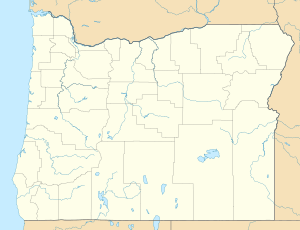Little Pudding River facts for kids
Quick facts for kids Little Pudding River |
|
|---|---|
|
Location of the mouth of the Little Pudding River in Oregon
|
|
| Country | United States |
| State | Oregon |
| County | Marion |
| Physical characteristics | |
| Main source | Waldo Hills near Macleay 462 ft (141 m) 44°52′54″N 122°53′26″W / 44.88167°N 122.89056°W |
| River mouth | Pudding River near Mount Angel 131 ft (40 m) 45°04′25″N 122°51′13″W / 45.07361°N 122.85361°W |
The Little Pudding River is a small river in Oregon, a state in the United States. It flows through Marion County. This river is a tributary, which means it's a smaller river that flows into a larger one. The Little Pudding River flows into the Pudding River.
The Little Pudding River starts in an area called the Waldo Hills, close to a town named Macleay. This is east of Salem, the capital city of Oregon. From there, it generally flows north until it meets the Pudding River. This meeting point is west of Mount Angel. The spot where the two rivers join is about 37 miles (60 km) away from where the Pudding River itself flows into the Molalla River.
River's Journey: Where it Flows
The Little Pudding River begins its journey near Macleay. It first flows towards the northwest, passing under a few roads. Then, it turns north for a bit before heading northwest again. Along its path, it goes under Oregon Route 213.
Soon after this, another small stream called West Fork joins the Little Pudding River from the left side. As the river continues, it flows past a place called Hazel Green. On its right side is an area known as Howell Prairie, and on its left side is a place called Lake Labish.
Later, the river turns northeast. It receives more water from other streams: Woods Creek joins from the right, and Lake Labish Ditch and Carnes Creek join from the left. Finally, the Little Pudding River passes under Howell Creek Road, near something called Parkerville Dam, and then flows into the Pudding River.
Dealing with Floods
Long ago, in the late 1800s, a special channel called Lake Labish Ditch was dug. This was done to drain a natural lake called Lake Labish. People wanted to use the land where the lake used to be for farming.
Before the 1950s, when the Pudding River had big floods, the water sometimes flowed backward up the Little Pudding River. This caused flooding in the valley around the ditch. To stop this, in the 1950s, a group called the Natural Resources Conservation Service built Parkerville Dam and a pump station on the lower part of the Little Pudding River. Their goal was to prevent this backward flooding.
Even with the dam, floods can still happen. For example, in 1996, water built up behind the dam and caused flooding in 15 homes in Keizer.
 | Precious Adams |
 | Lauren Anderson |
 | Janet Collins |


